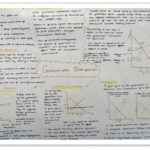It’s well known that regular exercise boosts brain health, and a fit brain is generally able to learn, think and remember better. However, during GCSE/ A Level exam season, many students abandon regular exercise or choose other ways of unwinding from revision. For those students that want to maintain their exercise routine, the most common question is whether it’s better to exercise before or after studying.
Here’s a quick summary of the latest research on why and when students should incorporate exercise into their revision schedule.
Timing of Exercise
Although many individuals will have their own personal preferences on when to exercise, recent research provides some interesting insights as to the impact of exercise timing n recall. The key finding was that timing a workout for a few hours after a study session is likely to result in better retention of the information just learnt. Whilst not yet fully understood, exercise seems to increase the production of biochemical in the body and brain related to mental function. Experts think the crucial component is physical response. Exercise energises the body in much the same way an emotional experience does – emotional memories are well known to be the longest lasting. The researchers caution, however, that at most exercise can have a supportive effect – the important thing is to study well first. Find out more details on the research findings by reading the NY Times article here.
Build Revision Concentration
In addition to the benefits for mental function, developing a good exercise routine helps build stronger “will-power”, helping students to return to their studies at times when they are tired or concentration is failing. For example, you probably know from experience that students find it really difficult to do homework or study after a school exam/test. Instead, they want to unwind as their will-power and energy has been depleted by the exam. Exercising helps by building endurance, stamina as well as boosting energy levels.
Exam Stress Levels
Exercise also helps with stress/anxiety and makes you happier. When you do a physically-demanding endurance exercise (running/swimming-yes, weightlifting-no), a large amount of endorphins are released by your pituitary gland. These block sensations of pain and produce feelings of euphoria, making you feel happier and more relaxed. In terms of the type of exercise, it doesn’t have to be high intensity; research has shown that it’s regular exercise that matters and that more gentle activities, such as yoga or a brisk walk, can also be beneficial.
As GCSE/ A Level revision and exam experts, we know that students benefit from regular exercise both academically and emotionally. Hopefully, you are now better placed to explain those benefits to your son or daughter and can encourage them to incorporate exercise into their daily or weekly study routine.








 See More Genuine Reviews
See More Genuine Reviews